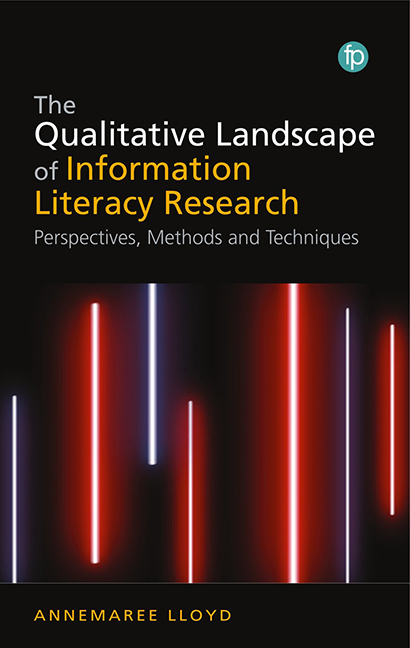Book contents
- Frontmatter
- Contents
- Figures
- Foreword
- Acknowledgements
- Introduction: The Qualitative Landscape of Information Literacy Research
- Chapter 1 Situating Information Literacy Research
- Chapter 2 Informing Information Literacy Research
- Chapter 3 Framing Information Literacy as an Educational Practice for Research. Learning Theories and Models
- Chapter 4 Qualitative Methods in Information Literacy Research
- Chapter 5 Collecting Data About Information Literacy: Data Collection Techniques
- Chapter 6 Planning for Research
- Chapter 7 Qualitatively Speaking and Doing Information Literacy Research
- References
- Index
Chapter 3 - Framing Information Literacy as an Educational Practice for Research. Learning Theories and Models
Published online by Cambridge University Press: 21 October 2021
- Frontmatter
- Contents
- Figures
- Foreword
- Acknowledgements
- Introduction: The Qualitative Landscape of Information Literacy Research
- Chapter 1 Situating Information Literacy Research
- Chapter 2 Informing Information Literacy Research
- Chapter 3 Framing Information Literacy as an Educational Practice for Research. Learning Theories and Models
- Chapter 4 Qualitative Methods in Information Literacy Research
- Chapter 5 Collecting Data About Information Literacy: Data Collection Techniques
- Chapter 6 Planning for Research
- Chapter 7 Qualitatively Speaking and Doing Information Literacy Research
- References
- Index
Summary
Introduction
Chapter 3 describes how information literacy is connected with learning and the theories that underpin this connection, and considers qualitative research that has been conducted. It does not describe the large corpus of academic or practitioner research which has targeted measuring information skills in higher education or is focused on school-based approaches to information literacy. The chapter then goes on to describe some key models of institutional frameworks and models that have been informed by qualitative research.
This chapter will allow researchers, practitioners and students in higher education and vocational sectors to develop knowledge and scaffold their own understanding of how these theories influence research into information literacy in an educational setting. While much of the information literacy research in this area has focused on learners developing information literacy skills or competencies, it is important to note that the information literacy prac - tices of librarians as instructors and the delivery of information literacy education has also been a focus of research.
The construction of sound teaching practice for information literacy has its basis in educational research into teaching and learning and draws from a variety of theoretical pedagogical frameworks and models. Theories and models create the frameworks for the representation of information literacy and influence the structure and shape of the learning environment. Information literacy instruction – what it is and how to do it – is a concern for both practitioners and researchers and significant attention has been paid to this dimension of the information literacy landscape in refereed journals, books, blogs and workshops. In general the research that is reported is quantitative and often employs surveys of students or library staff skills (Kolle, 2017; Pinto, Escalona-Fernández and Pulgarín, 2013). However, qualitative perspectives and approaches provide alternative perspectives and are influential in helping information literacy educators understand the complexity of information literacy as a learning and teaching practice.
Learning theories create a conceptual framework that can describe how people use information, how knowledge is created and how learning takes place. In academic and school settings, information literacy is often researched through a learning theory lens, and many librarians’ knowledge of teaching and learning practices is gained formally or through staff development delivered by their institutions.
- Type
- Chapter
- Information
- The Qualitative Landscape of Information Literacy ResearchPerspectives, Methods and Techniques, pp. 33 - 54Publisher: FacetPrint publication year: 2021



